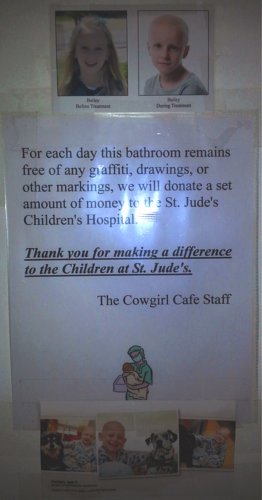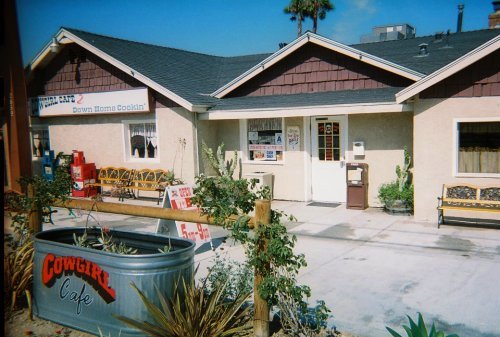A restaurant in Norco, California employs a unique method of fighting the ugliness of graffiti. It kills potential perpetrators with kindness -- the kindness of charity.
Recently my cousin came for a visit, and as always during her vacation stays, we grabbed a breakfast or two at The Cowgirl Café. The Cowgirl is a down-home, country-style restaurant serving made-from-scratch food. It's not fancy or trendy or big or part of a chain. And the food would never qualify as light fare, especially in health-conscious southern California. But that's the beauty of The Cowgirl. It's a throwback in food choices, in décor, and in style. It's hearty chuck wagon fare without the wagon, but with a lot of cowboy decor. And, as evidenced by the large, prominently-placed, waiting-area corkboard that's loaded with candid photos of the restaurant's smallest patrons and their pets, it's clearly the kind of business that loves its community.
But on this visit, I noticed something I'd not seen before, and it had nothing to do with the tasty food. On the inside of the restroom door was a paper sign surrounded by photos of children. It read:
"For each day this bathroom remains free of any graffiti, drawings, or other markings, we will donate a set amount of money to the St. Jude's Children's Hospital. Thank you for making a difference to the Children at St. Jude's.
I introduced myself to owner, Karen Hendrickson, and asked how she came to conceive her graffiti-free idea, and how well it was working for the restaurant. Karen told me that she'd heard of a doctor who had tried a similar method in his medical office and decided to try her own "charity not graffiti" approach. An identical sign is mounted in a second restroom in the café, and both have been there for about a year. Thankfully, they work.
In the year since the signs have gone up, there has been only one incident of damage, a small tag etched into the corner of a beautiful wall mirror. Karen hasn't covered the senseless mark, choosing instead to leave it there to reflect the shame of the person who did it. And shamed they should be.
I've never understood the need to deface other people's property, and I can only hope that those who do so will someday discover that tagging is more than illegal. It's a reflection of the character of the tagger. It's like saying to the world, "Hey! I selfishly think only of myself, and here's my mark to prove it!" Who feels the need to do such a thing? Graffiti causes millions of dollars worth of damage every year, and business owners must pass the cost of dealing with it on to their customers. Employing a win-win practice to avoid all the negatives associated with graffiti is inspiring, and The Cowgirl Café is living proof that the results are worth the effort.
Once a month, Karen sends a check to St. Jude's Children's Hospital, and sometimes the standard amount blossoms into something grander. When restaurant patrons find the "charity not graffiti" effort to be just as wonderful as I did, some decide to leave more than a tip for their server. They leave a little extra something for St. Jude's. Karen adds those additional gifts to her monthly donation and sends them along to the hospital.
The photos of the children have been sent to the restaurant by grateful parents. And there are also letters of appreciation from customers who notice the signs and applaud the restaurant's endeavor.
Most people have good hearts and a willingness to help solve problems. Karen's belief that her customers would choose to help children over choosing to scribble their names, or the mantra of the day, was insightful. Of course, most of The Cowgirl Café's patrons would never deface the property anyway, but for those few who chose to do so in the past, supporting a worthy cause by not giving in to the temptation to tag shows a willingness to help when invited to do so. And that makes the win-win of this small but meaningful give-and-take obvious.
The restaurant wins by remaining graffiti-free. The restaurant's customers win by not having to endure the inevitable price hikes necessary to cover the cost of removing ugly marks. St. Jude's Children's Hospital wins via donations that help it to serve, study and succeed in saving the lives of children in need. And the taggers who would have once pulled out a marker or a pen or a razor blade to tag walls, mirrors or fixtures, win by knowing that their restraint contributed to children who appreciate them, which feels pretty darn good all by itself.
The harm from graffiti is not limited to diners or less expensive hotels or mass-market retail outlets. The damage from graffiti is an equal opportunity scourge. It's just that most 5-star establishments have the means to clean it up quicker, rendering it rarely noticed in high-end places. But dealing with the damage is more of a struggle for small businesses.
The inspired and successful efforts at The Cowgirl Café show us just how fruitful the act of choosing kindness can be. Wouldn't it be nice if other commercial enterprises followed suit? Many charities would benefit, and dining, shopping, service, or other customer-oriented businesses helmed by thoughtful owners like The Cowgirl Café's Karen Hendrickson, would be doing something over and above providing their customers with a more beautiful experience. They would be changing lives.


